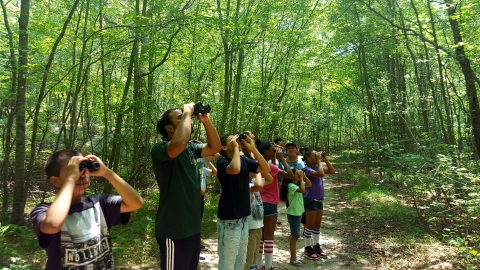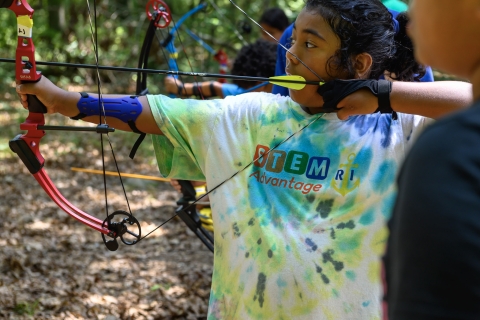Initiatives
Providence Urban Wildlife Conservation and Urban Bird Treaty Programs
With 80 percent of Americans living in and around cities, ensuring they can connect to nature is vital – both to people’s quality of life and the future of conservation. In response, the U.S. Fish and Wildlife Service (Service) established the Urban Wildlife Conservation Program (UWCP) with the overall goal of prioritizing conservation and recreational access efforts in urban areas so that together we can leave a legacy of abundant and healthy wildlife and wild lands for future generations of Americans to enjoy. At the core of the urban program are eight Standards of Excellence. The standards are:
- Know and relate to the community.
- Use stepping stones to engage people in nature.
- Build partnerships.
- Be a community asset.
- Ensure adequate long-term resources.
- Provide equitable access.
- Ensure visitors feel welcome and safe.
- Model sustainability.
Providence Urban Wildlife Conservation Partnership
The Rhode Island National Wildlife Refuges have been engaged with urban communities through the Providence Urban Wildlife Conservation Partnership and the Providence Urban Bird Treaty. The Providence metropolitan area anchors a population of 1.6 million people and many families do not have the resources to travel to remote national wildlife refuges. In an effort to connect school children and families with nature where they live, work, and play, partners work with school groups, using the Providence parks, to restore and maintain wildlife habitats, build nature trails and interpretive signs, and provide environmental education programs. The U.S. Fish and Wildlife Service designated the collaborative effort as the Providence Parks Urban Wildlife Refuge Partnership on May 5, 2014, and designated Providence as an Urban Bird Treaty City on May 8, 2019.
The U.S. Fish and Wildlife Service collaborates with other conservation organizations to leverage resources, staff and funds to broadly and comprehensively reach this urban community. The partnership builds on existing projects in the city to assess habitat and wildlife capabilities in urban greenspaces, develop interpretive nature trails, and support volunteers and youth hires to perform restoration projects and deliver education programs.
Addressing Barriers
While many Providence residents do not have the resources to travel to Rhode Island’s five remote National Wildlife Refuges, the city hosts a network of over 120 existing parks and greenspaces. All Providence schools are within ½ mile from one of these spaces and the majority of residents can find a park or a greenspace within a 10-minute walk. This unique opportunity allows partners in Rhode Island to build on conservation initiatives within the city alongside the Providence community. The Providence Urban Wildlife Conservation Partnership is a collaboration that started between the U.S. Fish and Wildlife Service, the RI National Wildlife Refuge Complex, the City of Providence Parks Department, and the Partnership for Providence Parks. This growing partnership strives to bring a conservation message to the neighborhoods of Providence in the places where families live, work, and play.
The work of the Providence Urban Wildlife Conservation Partnership addresses multiple barriers regarding access to nature for residents and students, including but not limited to:
- To address access to nature barriers, the PUWCP...
- Uses accessible public city parks as areas to play, learn, relax, and explore;
- Provides transportation to remote National Wildlife Refuges;
- Co-leads the Teacher Institute with the Roger Williams Park Zoo, where teachers spend a week in the field and are introduced to field biology, wildlife conservation, and Service work with the goal of bringing these lessons back to the classroom. Teachers receive year-round support for outdoor learning and a funded field trip to Ninigret National Wildlife Refuge;
- Offers year-round environmental education support for educators, community members, and local partners by the Conservation Program Coordinator for in school & after school programs, summer-learning experiences, community events and public activities;
- Works with local partners to support community efforts relating to coastal resiliency, tree equity, nature access, urban ecology connections and more.
- To address language barriers, the PUWCP...
- Offers free bilingual English/Spanish family-focused fishing events throughout the state to expand fishing access to the Greater Providence Community. Read more about Vamos a Pescar and Take Me Fishing Day events.
- Hires interns that offer bilingual programming.
- To address financial barriers, the PUWCP...
- Offers programming in tandem with Summer Meal Sites and/or providing meals at family-friendly events and programs to address food insecurity barriers;
- Ensures all programs are free and open to the public;
Supports community partners with grant writing and funding towards a common mission to increase nature access for all while bolstering healthy habitats for local and migratory wildlife.
To quote Robert Michael Pyle "What is the extinction of a condor to a child who has never seen a wren?" We want to introduce children to the wrens, squirrels, hawks, fish and insects living within their parks!
The Urban Wildlife Conservation program centers on the idea that building strong, meaningful relationships with local communities is key to achieving conservation success. Learn how you can get involved, follow the PUWCP Facebook page, or read stories about the PUWCP.
Indigenous Youth STEM Camp
The Service works with conservation partners, including the Tomaquag Museum, the Northeast Canyons and Seamounts Marine National Monument, and Mystic Aquarium, to co-steward and offer an inspiring Indigenous Youth STEM Mentoring Camp at Ninigret National Wildlife Refuge. Each summer, Indigenous youth from various Tribes experiment with new engineering and science concepts, learn about collective conservation work, and participate in outdoor recreation. These young scientists and engineers expand their knowledge in environmental stewardship to protect their wild places and wildlife. View the 2024 Indigenous Youth STEM Camp booklet, with photos taken by one of the camp leaders, Nicholas Belt.



